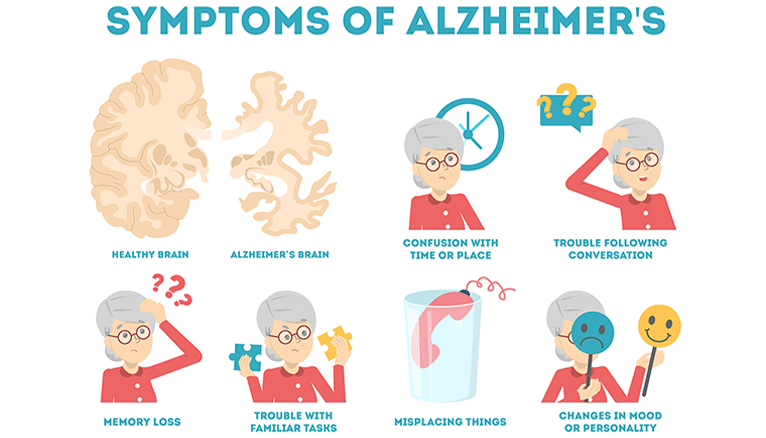Understanding Alzheimer's Disease: A Comprehensive Guide for Caregivers and Loved Ones
By:

Apex Hospitals
12-07-2023 5 Min Read

What is Alzheimer's disease?
Alzheimer's disease is a progressive neurodegenerative disorder that primarily affects older individuals. Alzheimer's is a brain disorder that causes a gradual decline in memory, cognition, learning, and organisational abilities. Eventually, it impairs a person's ability to perform fundamental daily tasks. It is the most common cause of dementia, accounting for approximately 60-80% of all cases. Alzheimer's disease symptoms worsen over time. Researchers believe the disease process may begin at least 10 years before the onset of symptoms.
Differentiating Alzheimer's disease from dementia
Alzheimer's disease and dementia are often used interchangeably, but they are not the same. Dementia is an umbrella term that describes symptoms affecting memory, thinking, and social abilities severe enough to interfere with daily functioning. Alzheimer's disease, on the other hand, is a specific type of dementia. While Alzheimer's disease is the most common cause of dementia, there are other types, such as vascular dementia, Lewy body dementia, and frontotemporal dementia.
Understanding the causes of Alzheimer’s disease
Alzheimer's disease, like other forms of dementia, is caused by the demise of brain cells. It is a neurodegenerative disorder, which means brain cell death occurs gradually. In Alzheimer's disease, the brain tissue contains fewer and fewer nerve cells and connections, and microscopic plaques and tangles accumulate on the nerve tissue.
Plaques form between brain cells that are decaying. They are composed of the protein beta-amyloid. Meanwhile, the tangles exist within the nerve cells. They are composed of a different protein termed tau.
Researchers do not entirely comprehend the causes of these changes. Multiple variables may be implicated, such as a combination of genetic, lifestyle, and environmental factors that may contribute to its development. One of the primary risk factors for Alzheimer's disease is age, with the majority of cases occurring after age 65. Other factors, such as family history, certain genetic mutations, cardiovascular disease, and head injuries, may also increase the risk of developing the disease.
Recognising the early signs of Alzheimer’s disease
Identifying the first signs of Alzheimer's disease can be challenging, as they may be subtle and easily dismissed as normal ageing. However, early detection allows for early intervention and better management of the disease. Some early signs of Alzheimer's disease include:
- Memory Loss: Forgetting recently learned information, frequently misplacing items, and relying heavily on memory aids.
- Difficulty with Problem-Solving: Struggling with basic math calculations, difficulty following recipes or instructions, and challenges in planning and organizing.
- Language and Communication Problems: Difficulty finding the right words, frequently repeating phrases, and having trouble understanding conversations.
- Disorientation and Confusion: Getting lost in familiar places, difficulty recognizing faces, and forgetting the time, date, or location.
- Changes in Mood and Personality: Increased anxiety, depression, irritability, and changes in personality and behaviour.
Stages of Alzheimer’s disease
The severity of Alzheimer's disease rangeMild Alzheimer’s disease:
Mild Alzheimer’s disease:
Individuals with mild Alzheimer's disease may experience the following memory and cognitive difficulties:
- requiring more time than usual to complete daily duties
- having trouble managing money or paying bills
- wandering and getting lost
- experiencing personality and behaviour changes, such as getting upset or angry more easily, hiding things, or pacing.
Moderate Alzheimer’s disease
The brain regions responsible for language, senses, reasoning, and consciousness are damaged in moderate Alzheimer's disease. This can result in the subsequent symptoms:
- Greater memory loss and confusion
- Difficulty in recognising family and acquaintances.
- Incapable of acquiring new knowledge
- Difficulty completing multi-step tasks, such as getting dressed.
- Difficulty adapting to new situations.
- Impulsive behaviour
- Hallucinations, delusions, or paranoia
Severe Alzheimer’s disease
Plaques and tangles are present throughout the brain in severe Alzheimer's disease, causing the tissue to diminish significantly. This can result in:
- inability to communicate
- dependent on others for care
- being bedridden for the majority of the time
Diagnosis of Alzheimer’s disease
Various methods determine the diagnosis of Alzheimer's disease in a patient with memory problems. This is because many other conditions, particularly neurological conditions, can induce dementia and other Alzheimer's symptoms.
A doctor will ask about your health and lifestyle while diagnosing Alzheimer's. Your doctor may question a family member or carer about your symptoms.
A provider will also perform:
Treatment of Alzheimer’s disease
While there is currently no cure for Alzheimer's, several treatment and management approaches can help alleviate symptoms and improve quality of life. These may include:
Medication: Medications such as cholinesterase inhibitors and memantine can help manage cognitive symptoms and slow down the progression of the disease.
Therapy: Cognitive stimulation therapy, occupational therapy, and speech therapy can help individuals with Alzheimer's disease maintain cognitive function, independence, and communication skills.
Supportive Care: Assisted living facilities, memory care units, and in-home caregivers can provide necessary support and supervision for individuals with Alzheimer's.
Caregiver Support: Caregivers play a vital role in managing Alzheimer's disease. Support groups, respite care, and caregiver education programs can provide valuable resources and support for caregivers.
Research and Clinical Trials: Participation in clinical trials and research studies can contribute to advancements in Alzheimer's disease treatment and management.
Understanding Alzheimer's disease is crucial for caregivers and loved ones supporting individuals with this condition. Caregivers can provide the best possible care and support by recognizing the early signs, understanding the causes, and learning about available treatment and management options.
Related Articles
Connect With Us
Health In A Snap, Just One App.
KNOW MORE































































